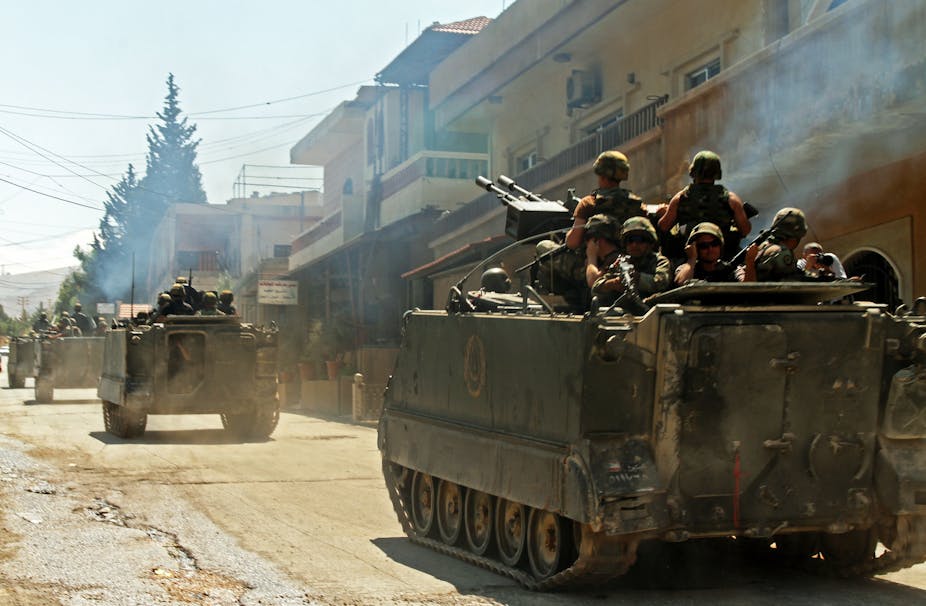The Islamic State’s campaign across Northern Iraq and Syria has entered Lebanese territory for the first time. Long affected by the spillover of refugees fleeing its war torn neighbours, the brief battle for the border town of Arsal marks the first major rebel incursion into Lebanese territory since the start of the Syrian Civil War. This alarming development, and the incremental disintegration of Iraq and Syria, heighten concerns that Lebanon cannot insulate itself from the conflicts surrounding it.
Lebanon is a microcosm of conflicts over the idea of the nation state in the Middle East. An outlier in the region, it is neutral, pluralist and democratic – at least in theory, though not always in practice.
Across the region, civil wars, insurgencies and ethnic conflicts erupted in the wake of the Arab Spring, yet the Lebanese cling firmly to the only system of government they know – a power-sharing arrangement between its numerous religious communities known as the National Pact.
A power sharing state
Not unlike Iraq and Syria today, Lebanon experienced a consumptive and self-destructive civil war from 1975 to 1989, a contest over the nature of the state and the legitimacy of its power-sharing arrangements. At the end of that conflict, which saw this fragile and deeply divided society become host to radical groups from across the region, Cold War conflicts, and the Arab-Israeli conflict, Lebanon returned to its old form of government.
That this is not going to happen in Syria and Iraq speaks volumes about Lebanon’s resilience and the durability of a political system that binds Christian and Muslim communities together in a state committed to the concept of “no victor-no vanquished”. Embarking on a marriage of convenience that ended colonial rule during World War II, Christian Maronites and Sunni Muslims compromised on their own nationalist aspirations and created a state premised on religious diversity, tolerance and power-sharing.
Mounting challenges
But Lebanon has been in limbo since 2005 and the internal and external challenges have mounted year on year. The country is reliant to a great extent on the protection of external powers for the maintenance of its position and has sat uncomfortably in the Middle East state system. We should, therefore, not be sanguine about its prospects of surviving the current challenges faced by the region.
Syria, in particular, had significant sway over Lebanese politics. The Syrian Army acted as a force for stability in Lebanon, following the arrival of troops in 1976, but it was forced to withdraw in 2005 after the assassination of former Lebanese prime minister, Rafic Harari.
But since that withdrawal, Lebanon has seen the commencement of fighting between its pro-Iranian Shi’a Islamist group Hezbollah and Israel in 2006, between its government and Hezbollah in 2008 and sporadic terrorist attacks in recent times often aimed at Hezbollah. There has also been endemic conflict between Sunni and Alawi factions in Tripoli. Plus, it has felt the consequences of the Syrian crisis more than any other state, with the exception perhaps of Iraq.
Syrian spillover
Lebanon is today host to well over a million refugees who have fled the crisis in Syria. This figure does not include the hundreds of thousands of Syrians in Lebanon who have not sought refugee status, nor Palestinian refugees in Lebanon of which there are over half a million. The burden of this humanitarian disaster on a country with a population of just over four million nationals is unsustainable.
And now, Lebanon’s National Pact has been broken. Hezbollah’s involvement in the Syrian civil war means that Lebanon is not a neutral party to it and will probably pay a price for this in the future. Shi’a Muslims make up Lebanon’s largest community and Hezbollah is the country’s most potent political and military force. This fact causes deep discomfort for its Sunni and Christian communities (although the Maronite Christians are split on the issue).
Hezbollah used to be greatly reliant on Damascus for its political and military position in Lebanon. But the tables have now turned. At Iran’s behest it is playing a crucial military role in supporting the Assad regime in Syria. In ideological terms, Hezbollah’s raison d'être is “anti-Zionist resistance” against Israel (which occupied southern Lebanon from 1982-2000). This jars with its present role of combating the Islamist and secular rebel groups that are attempting to overthrow the Syrian regime.
In need of help
This is but a snapshot of the multifaceted challenges facing Lebanon today. Continued and increasing Western support will be crucial in helping the country manage these problems. The Lebanese Army needs considerable support and must avoid being dragged into this conflict, more can be done to secure Lebanon’s borders, aid efforts must be sustained to cope with the refugee crisis and efforts are necessary to avoid a resumption of conflict between Israel and Hezbollah.
The region cannot afford to lose Lebanon. If it succumbs to the civil wars engulfing Syria and Iraq then the post-war state system in the Levant will completely collapse. Oddly enough, what Lebanon presently has in its favour is that the US, Iran, Israel and Saudi Arabia all have a clear interest in making sure that this does not happen.

